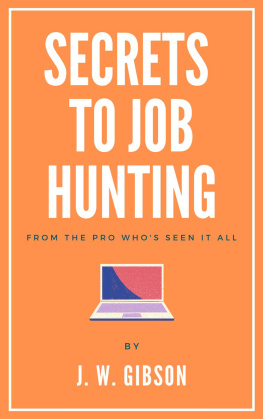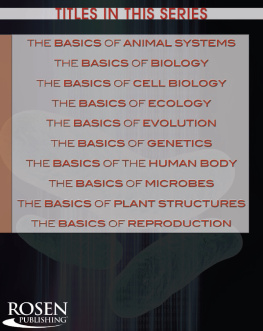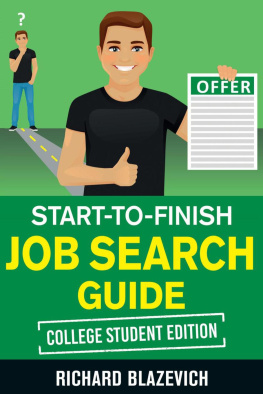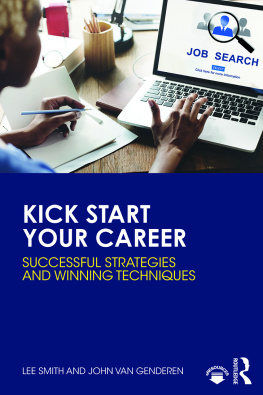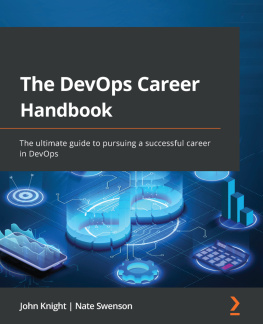Chapter 1. So youre looking for a job
If its your job to eat a frog, its best to do it first thing in the morning. And if its your job to eat two frogs, its best to eat the biggest one first. - Mark Twain
Looking for a job is notoriously one of the most stressful things in life. There are many steps in the process, and each step is another risk of failure or rejection. Until you land what you are - or are not - looking for, hunting for a job can feel like overwhelming.
The trick is to remain levelheaded at approaching the steps one by one. This book is aimed at helping you do just that. We will take you step-by-step through the process with examples, worksheets, brainstorming sessions, and more.
Beginning your job hunt
It is called a job hunt for good reason; it is literally a hunt. You need to know how big your prey is and come prepared with what you need to take it down. This preparation begins earlier than you may expect.
Before you begin crafting your resume, drafting your cover letter, or even scrolling through job boards for hours on end, you must know exactly which jungle you are looking to forage. If you are already in the career you wish to progress in, then congratulations! You have already done most of the legwork for job hunting. You know the lingo, you have seen other people do it, you have connections and you have knowledge. However, if you are looking to move to another city, it can change the way the prey is approached.
If you are just starting out, or are an industry-changer, you will have to take it from the top.
It is important to know the industry you are in, or looking to get into; you have to walk the walk and talk the talk. This is for many reasons. Everything from how you dress to how you speak can vary depending on where you are looking to work.
Most people have heard the expression: Dress for the job you want, not the job you have. There is a lot of power in going to work looking to achieve more, do more, and be more. It resonates. That is often why people wear suits to interviews (even if it may not be necessary but more on that later).
For instance, an astronaut would not show up to an interview at an auto body repair shop talking about their knowledge of astrophysics. That is not what is going to be of use in the job to come. Instead, they could boast their knowledge of mathematics and engineering, as it would relate to the tasks at hand.
In terms that are a bit more down to earth, let us say this: a car salesman who is looking to become an insurance broker would have a lot of transferrable skills , like negotiation, working with a book of business, client-relations, etc., but there are things about the industry they inherently would not know. The task at hand would be to learn some of the career jargon. They should never have to ask what something in a job description means or be surprised by an unfamiliar term in an interview.
It is important to study up on the buzzwords. Be warned! A lot of the time they includes several acronyms.
TIP : Dont shoot yourself in the foot by reciting an acronym letter by letter. A lot of the time they are supposed to be read and understood as a word. I: software-as-a-service, or SAAS, should be spoken out as Sass within the industry. Its important to sound like you know what you are talking about so it doesnt sound like youll need a lot of training. When youre looking to get hired, its your job to do all the work on the back end without having to resort to learning or asking on the fly.
Aside from talking the talk, walk the walk. Know who the top competitors are and what sets your target-employer apart. It will be these little details of knowing the industry that will set you apart and launch you ahead.
If youve been in the industry that youre applying to already, this will be secondhand.
TIP: Twitter can be a great tool for getting daily doses of industry updates, and most everyone whos anyone has a handle. Find a list of companies, CEOs, and influencers to follow. A little light scrolling every day will help you get the latest news and get you more comfortable amongst a group of industry professionals.
Twitter scrolling or reading through newsletters is just to fill your spare time. It is important not to get overly excited about what other people are doing. Do some reflecting, and realize, honestly, what your strengths and weaknesses are and which jobs that you are best fit for. If there was something in your last job that you hated, try to move away from that in your next job, or, better yet, grow from it.
Knowing all of this will help you better understand how to target possible employers.
Even if there is no open job posted, you can put yourself on an employers radar through social media. Follow the threads that they do, and do not be afraid to engage in commentary [so long as its relevant and thoughtful]. These moments will prove that you are very engaged in the industry and can provide valuable insights or feedback in relation to the work you either have or seek. They can also get you a chance to chat with someone before a job is posted!
Knowing how to network online
Creating an online presence is vital to knowing how to network. By, literally, social networking, you are opening the opportunity for conversation that most people have a hard time doing face-to-face (more on that shortly.)
Though social networks are often used primarily for personal use, there still exists opportunity to get in touch with people within your target industry. Its a great way to showcase yourself in alignment with your interests.




